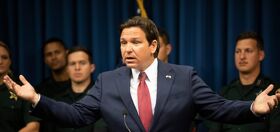
Yesterday morning, Defense Secretary Robert Gates announced, after a 45-day study, the new rules that being implemented immediately to curb the worst of the Don’t Ask Don’t Tell dismissals. Essentially, only soldiers that voluntarily come out will be subject to investigations; a soldier outed by someone else won’t be entirely safe, but his accusers will have to testify under oath, and anonymous outings won’t be material. But this still leaves a lot of questions unanswered. And we’d like to have some definite positions on them before the Pentagon finishes up its nine-month policy review in December. Care to help us out?
If a soldier is on the receiving end of one what Gates’ describes as a “malicious outing” — where a jilted ex-partner outs the person in retaliation — does that mean the soldier is free of DADT? And can serve as an openly gay man? Or just that they won’t investigate the ex-partner’s claims, but if the soldier outs himself, he could still be investigated? We’re inclined to believe the latter; the malicious outing simply can’t be used as evidence in an investigation. But if a gay soldier’s comrades and COs know he’s gay because of the outing, it won’t take much to find other so-called evidence to out him in more kosher ways.

What constitutes protected and private data? The new rules will bar any medical data or security reviews from being used as evidence in a DADT dismissal. Also, conversations with legal counsel. But what is the definition “medical data”? We imagine soldiers’ consultations with doctors will be off limits as always (like they are with lawyers), and that the new rules would prohibit any “leaked” medical documents that might find their way into the wrong hands. But let’s say an entire unit at Ft. Bragg decides to participate in a local blood drive, and one gay men is forced to sit out because of FDA rules. Does dodging the question of why he’s not taking part constitute reason to investigate his sexuality? Does it constitute “telling”? Or is it protected medical data? Also: Hasn’t this always been the policy?
What happens if a four-star general is suspected of being gay? Or another senior ranking officer? Even with Gates increasing the rank an officer must have (to a one-star general) to initiate an investigation, can a lower-level officer lead dismissal charges against a higher-ranking one? Common wisdom says a lower-ranking officer would simply never challenge somebody whom outranks him, but then we get to the malicious outing portion of the program: What if the lower-ranking officer wants his gay boss’ job? (Yes, we know the likelihood of this situation ever arising is slim to none. But still, what’s protocol?)
How about we take this to the next level?
Our newsletter is like a refreshing cocktail (or mocktail) of LGBTQ+ entertainment and pop culture, served up with a side of eye-candy.
Will officers still be allowed to publicly support DADT? Lt. Gen. Benjamin Mixon, the commander of U.S. Army Pacific, submitted a letter to the editor to Stars and Stripes saying he opposed repealing the law, and now he’s in trouble with Sec. Gates and Joints Chiefs of Staff chairman Adm. Mike Mullen. (Mullen told reporters Mixon is “obliged to certainly follow the direction of leadership right up to the president,” and if he feels “so strongly about it” then “the answer is not advocacy; it is in fact to vote with your feet.”) We all know the military isn’t headquarters for free speech, but just because the president says he wants DADT repealed, and his Pentagon leadership agrees, does it mean everyone must fall into line? Should officers opposing a repeal be treated the same way as white officers who say they don’t want to serve alongside blacks?
Will dismissed soldiers have any hope of re-enlisting? Gates made clear that the new rules will apply to current and future investigations only, which means anyone already dismissed under DADT — even with evidence used from the very malicious third-party outings that are now banned — won’t be welcomed back. This means folks like Lt. Col. Victor Fehrenbach, who had to come forward to defend himself against false rape charges, and Air Force Maj. Mike Almy, who was outed when his personal emails were surreptitiously included in his DADT investigation, remain persona non grata. But if they aren’t “automatically” allowed back in, can they attempt to re-enlist? We’re guessing not, because they’ve publicly identified as gay on numerous cable news programs, but what about the silent majority of dismissals who’ve taken their discharges and kept quiet? If these folks never publicly got involved in “telling” anyone, do the new rules forever make them ineligible? Perhaps we’ll know more in December, when the full report on repealing DADT is revealed.
We certainly haven’t covered all the unknowns. What questions do you still have? And perhaps some of our questions about have been answered, but we haven’t looked in the right places. Tell us.



















fredo777
Frankly, I don’t want to discuss anything else about DADT unless it’s how they’ve just fully repealed DADT. Anything short of that is pointless + a waste of time.
Meg
I feel like this is way more complicated than it needs to be. A complete repeal of DADT would be a lot easier — doing it this way is making it harder on everybody involved.
Hyhybt
It would be easier, if it were possible at all. Those implementing these adaptions don’t have the option of a full repeal and are doing what they can in the meantime; laws, as usual, have to go through Congress.
Robert
SPN Headlines Exclusive: Military Policy on Gays: “Don’t Kiss, Don’t Yell”
http://stupidassnews.wordpress.com/2010/03/26/new-military-gay-policy-dont-kiss-dont-yell/
Keep smiling! 🙂
Michael @ LeonardMatlovich.com
It’s VERY simple:
1. “We’re inclined to believe the latter; the malicious outing simply can’t be used as evidence in an investigation.”
WRONG! WRONG! WRONG!
NOTHING has changed about the previously existing prerequisite for “credible information” to initiate a discharge investigation except to raise the level of people who can trigger it and that the information be given under oath.
2. No matter how high the level, no matter how long the process takes, if they believe the person accusing you of being gay under oath, YOU WILL BE DISCHARGED.
The whole CHARADE of “being more humane” is PREMEDITATED BULLSHIT. If you they believe the testimony [really, whether your actually gay or not], it won’t matter WHAT the motivation of the person who outs you is YOU WILL BE DISCHARGED. I can hear it now: “But your honor, yes, they have evidence I robbed that bank but ya gotta let me go because they were just mad I wouldn’t share the loot.”
3. As for the confidentiality situations, precedent [e.g., violations of the “Don’t harass” provision going unpunished] is that one is at the total mercy of the ethics of everyone involved. No matter WHAT the new policy says, there is room for a homophobic commander to trigger an investigation based on, e.g., a doctor breaking confidentiality, and then claim he had other reason to suspect.
4. Re readmitting anyone discharged for being gay. With respect, YOU STILL DON’T GET IT. The ban on known gays serving is STILL 100% in effect. NO ONE gets a pass from the Pentagon, past, present, or future simply because there was ill-will on the part of anyone involved in their finding out the person was gay.
5. Adding the proverbial insult to injury is that anyone currently under investigation or awaiting final discharge resulting from such “unfair” outings will have to go through a virtual retrial if they want to challenge it. BUT the RESULT will be the SAME, even after their accuser must now swear under oath: if there’s enough smoke you WILL be fired. That’s why slimy fox Gates kept using the phrase “fact-finding inquiry.” If the fact is that you’re gay, you WILL be discharged.
Understanding that, there is no long term benefit for anyone not in a situation like Victor Fehrenbach. If they allowed him to demand this phoney baloney new hearing, and someone from the Boise police department testifed under oath that VF told him/her he was gay [REGARDLESS OF THE REASON], his discharge would STILL be upheld.
BUT, because he’s so close to 20-yr. retirement, it might draw it out long enough that he’d hit it and still be eligible for $46,000 a year Air Force pension for life. If his discharge is finalized before then, he loses it.
chris
I got a question. It’s been two days since these “changes” to policy have been in effect. Why have I not heard ANYTHING from my commander, first sergeant, or the military Email Net about this? If this policy is effective immediately, then it should have been sent to all the units for publishing or at least announced through other channels besides television. I have a feeling I know the answer. Because they don’t want to “upset” the chain of command by forcing them to echo any pro-gay announcements. I’ve been following the many internet stories about this, but haven’t heard a WORD from anyone at work that they even know about it. Must be meaningless.
Hyhybt
@chris: What I’ve read elsewhere is “within 30 days,” not “immediately.” That may have something to do with it.
reason
What happens if a four-star general is suspected of being gay:
The President and Secretary of Defense have the authority to commence a court martial or empower any other commanding officer to do so. For wandering minds who think well what if the Secretary or President is found to be gay? It would be inconsequential since they are civilians and not held under military law. The civilian leadership of the armed force makes it simple to prosecute high ranking officer that may be intimidating to their subordinates, Generals have been disciplined throughout history.
Will officers still be allowed to publicly support DADT?
If they do so in the guidelines being set by the military, yes. The general was reprimanded because he deviated from the rules put in place to gather the opinions of those who are against DADT, like him, and those that support it. Whites that don’t want to serve with blacks and blacks that don’t want to serve with whites are free not to enlist. Once enlisted they are bound by the rules, if they choose to act in a manner that violates those rules they can be subjected to a court-martial. There is no free speech in the military, and for very good reason.